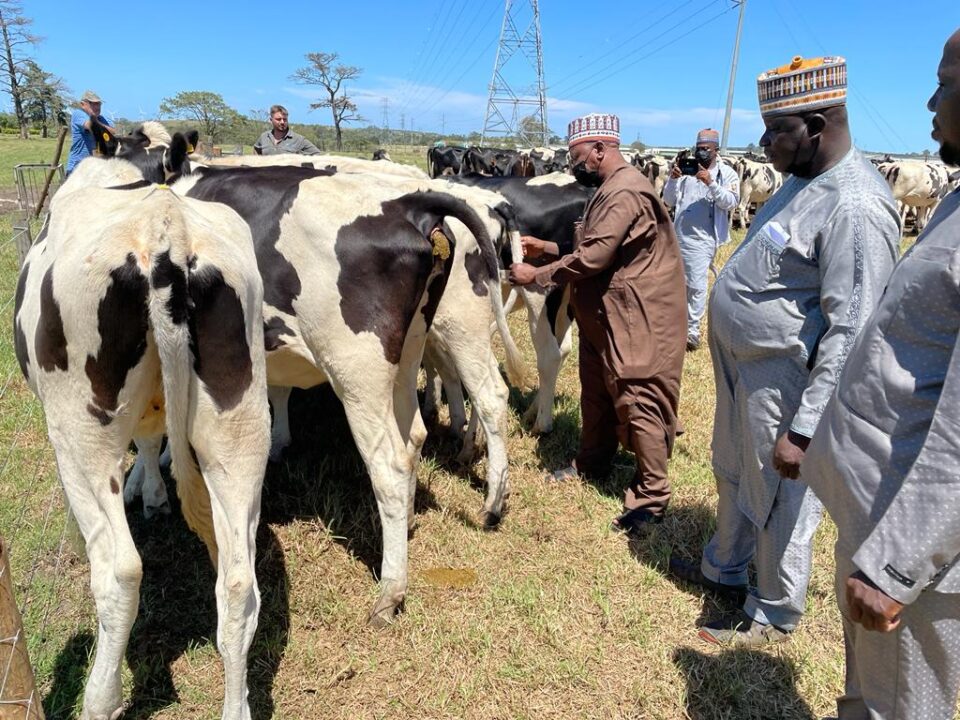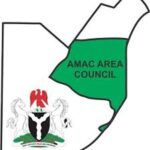Sokoto State government recently imported high quality Brangus cows from South Africa and established an artificial insemination centre to improve the production of meat and milk in the state, targeting N500bn revenue annually. MYKE UZENDU in this report takes a look at the project and its effect on the economy of the state.
The administration of Governor Aminu Tambuwal has perfected plans to explore all the value chain in animal husbandry business ranging from livestock farming, poultry, milk and meat production, fishery, animal feed production to artificial insemination which will boost the revenue of the state with about N500 billion naira annually.
The government is also planning to establish the first Specialist Veterinary Hospital in Sokoto which will build the requisite human capital needed to drive the ambitious agricultural revolution which the Tambuwal administration intends to achieve.
The Commissioner for Animal Health and Fisheries Development, Prof. Abdulkarir Usman Junaidu, who took journalists round some of the animal husbandry value chain facilities in the state including the Sokoto Diary Plant, the Sokoto Artificial Insemination and Animal Diagnostic Centre, the Veterinary Clinic at Runjin Sambo as well as some private animal farms and ranches in the state disclosed that Sokoto is leading in livestock farming as it has over 3.5million cattles, 2.5 million sheeps and over 4 million goats including the Sokoto red goat which the state government has made its preservation from becoming an endangered specie a priority.
He disclosed that the Tambuwal administration came up with a five-year strategic plan known as “Sokoto Cattle Breeding Programme” aimed at synergizing all the interventions in livestock production and reposition the state as number one in milk and meat production.
Prof. Junaidu who recently won an award in South Africa due to his patronage of the Brangus cow specie said that the government distributed the improved specie to about 13 ranches in the state at no cost. He explained that the farmers pay back with milk and calf which is fattened and distributed to other farmers. He said that the present administration has a target of raking in N500 billion annually from meat, milk and diaries production.
“We want to synergize all the interventions, especially when it comes to livestock development to ensure that we get the maximum output. You know, the Sokoto state is a leading state in terms of livestock production, we have over 3.5 million cattle, 2.5 million sheep and over 4,000,273 goats.
“We divided this program into components, one of which is the importation of livestock, exotic breeds of livestock, the invertebrates imported from South Africa. We imported them in 2019 and then we distributed them to 13 cluster farmers, which each one of them is getting about nine exotic breeds, male and female combined.
“The essence is to improve on our own, the genetic potentials of our own local breed, because we realize that our local breed in terms of milk production can only produce about one to three and maximum of four litres of milk per cow. But we tried to improve it now, we have distributed these animals and we have realized that with the combination of the crossbreed we have done, we can produce between 10 to 30 litres per milking per cow” Junaidu revelaed.
To improve the yield of the local cows, the government established an artificial insemination centre and sperm bank where the semen of the improved specie is preserved for cross breeding and embryo transfer. The state government also acquired a fully equipped mobile laboratory with which it visits farm settlements for the treatment of sick animals and for the purposes of conducting medical examinations as well as vaccination.
Shedding more light on why the government undertook such a capital intensive project, the Commissioner continued, “We also realize that in terms of meat production the local breeds cannot give more than 150 to 250kg but for now we are able to raise it to about 500 to 1000kg in less than two years. This has improved not only meat production but has also improved revenue generation for the livestock farmers, as well as employment of more youth into these farms.
“The other component is that of artificial insemination and embryo transfer. We did this because we realize that not everybody can afford these animals. They are very costly and in addition to the animals that we give to these cluster farms, we also give them a standby generator. We realize that most of the pastoralists cannot afford these animals, so we decided to bring in semen and embryos.
“Currently now we have covered more than two thirds of our local governments in simulating and transferring embryos into various local breeds. We are pretty sure that in the next two three and five years we’ll have different improved breeds. This will not only increase the milk production which the country has banned from importing, but also in terms of meat production, you will have a lot of meat” the commissioner stated.
With the interventions, according to the commissioner, the Sokoto State Diary Plant can produce about 5,000 liters of milk daily.
“We can be able to process 5000 liters of milk a day and this milk is collected from these cluster farms. Some pastoralists are not able to sell their milk; you know they even throw it away. So we have milk collection centers where we collect and processes into yogurt and then sell to the public as well as even take it to school for school feeding.
“This has gone to improve the economy not only of the pastoralist, but also of the cluster farmers. We’re already in touch with some local state government and some countries that are in need of our milk and our meats. We have secured vehicles for their transportation. This is meant to empower our economy and that of the farmers”.
The government is also investing heaving in animal feed production and has also set aside 5000 hectares of land for planting of animal feed which will also be equipped with dams to take care of dry season farming.
“We have already started feed production, in one of our centers we started with over 5000 hectares cleared and prepared for irrigation but unfortunately because of the insurgency, we had to suspend it and move to another safer area where we have already cleared.
“We are producing over 2000 bags that we combined from various plants and grasses. The intention is that these feed that has been produced will now be supplied to these clusters at a subsidized rate”
To ensure that animals have unimpeded access to food and water the state government reactivated the grazing reserves in the state.
“We have 19 grazing reserves that has the capacity of up to over 20,000 hectares. In addition to the ranching proposals, we have started advocating for grazing reserves and we will plant feed of different grasses, different legumes, so that by the time these plants grow, all our headers will now come back and settle.
“We have minimal farmer – headers clashes in this country because we have an organized system where even farmers and Fulanis settle in the same place, some of them farming and rearing. That’s the type of cooperation we’re trying to promote”.
Most importantly, the commissioner hinted that veterinary doctors are always on hand to attend to the health needs of the lives stock and also administer regular vaccines to keep them healthy.
“We have an ambulatory vehicle that goes to any part of the states to conduct operations and treatments in the bush. We also have a call duty available that goes in to bring our consultants at any point in time that his attention is needed by the young doctors.
“Currently the governor has already approved a space for us where we are going to establish the first specialist Veterinary Hospital in this country. This is meant for training of our younger doctors to become consultants and it will be a training ground at least for most of the North Western states of this country”
On the fisheries, the Commissioner disclosed that the Goro dam and other rivers in the state have the capacity to raise over 100,000 metric tons of fish. He said that to ensure that the tempo is sustained and improved upon, government purchased two million fingerlings and emptied it into its rivers and lakes across the state and banned citizens from fishing activities for six months to enable the fingerlings mature and procreate.



